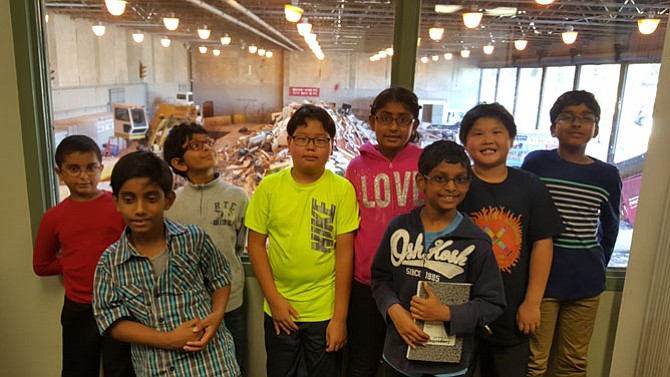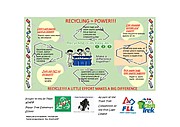Team AMP at Poplar Tree Elementary includes Austin Thomas, Praneeth Kemisetti, Arnav Nanduri, Matthew Kweon, Mallina Shah, Anish Paspuleti, Alton Lin, and Advaith Gajulapally. Photo Contributed
The First Lego League (FLL) Team AMP of Poplar Tree Elementary School is a group of eight students full of ideas about recycling. The name AMP is derived from the first letters of their first names. Letter “A” is the first letter of Advaith, Arnav, Austin, Alton and Aneesh. Letter “M” is from the first letter of Mallina and Matthew … and letter “P” is the first letter of Praneeth. Also, they believe that recycling is the power and power (electricity) is measured in AMPs. That is why the name Team AMP.
As part of the FLL activity, these fourth graders from Poplar Tree ES have started researching about the plastic recycling issue and based on their research, they believe that people in America don’t recycle plastic enough …. and that poses a major environmental issue and results in ecosystem imbalance.
The students decided the solution to this problem is to educate people and persuade them to recycle plastic more. Motivated by the encouragement they got from the principals of Poplar Tree Elementary school, Team AMP has set out to reach to as many people as possible to explain the benefits of plastic recycling. More information about team AMP’s research and their solution can be found at:
https://www.youtube.com/channel/UC5fau5pXacXdNnZb04SYv6w
https://m.facebook.com/FLL-Team-AMP-1475960279379682/
As part of the research, they have visited the Fairfax County Recycling plant and the American Recycling center in Manassas. Thanks to staff at these recycling plants, the students learned about the plastic recycling process. Then, they started researching about plastic and problems caused by excessive usage of plastic. Here is some information they learned about plastic, its usage, and benefits of recycling:
Nearly 90 percent of the waste in the oceans is plastic.
About 80 percent of marine trash comes from land, swept by wind or washed by rain off highways and city streets, down streams and rivers, and out to sea.
The Great Pacific Garbage Patch is exactly what it sounds like: a giant floating patch of trash off the coast of California. It is twice the size of Texas. It appears that there are about six large garbage patches in the oceans.
About one million seabirds and 100,000 sea mammals are killed annually because of garbage in the ocean.
The United States is the world's leading consumer of bottled water: Americans buy 28 billion bottles of water annually, and 70 to 80 percent of those bottles end up in landfills. Each year Americans throw away enough of the material to circle the earth four times.
For every 1 ton of plastic recycling, about 7 yards of landfill space is saved. By recycling, people can also help save 80 percent of the energy that’s typically used when making new plastic bottles, containers and other items instead of recycling.
Recycling in Northern Virginia remains at about 35 percent.
Recycled plastics are used to make items such as clothes, carpet, containers, bottles etc.
After their research, they then surveyed about 40 people in Chantilly area about plastic recycling and found that more than 70 percent of people do not know enough about plastic recycling. After brainstorming sessions under the guidance of their coach, these children came to the conclusion that educating people is the best possible solution.
As part of the community outreach, team AMP is visiting schools, libraries, retailers in the area to spread the word. So far they have visited Poplar Tree Elementary School, Chantilly Public Library, Costco, Greenbriar West Elementary School and Target. Some of these institutions have agreed to let team AMP post their flyer on their premises to promote recycling. Team AMP is also using social media such as Facebook, Twitter and YouTube.

